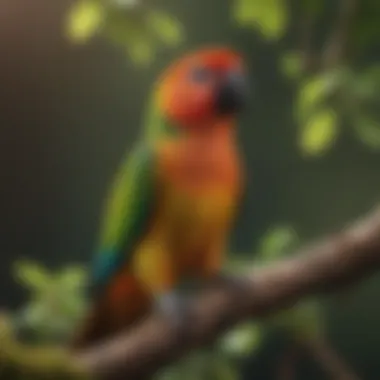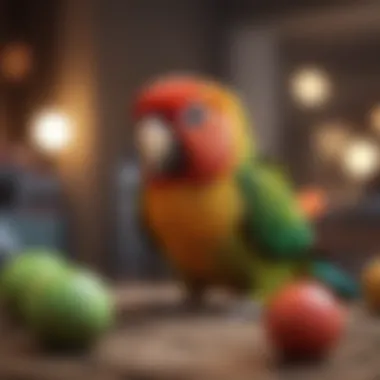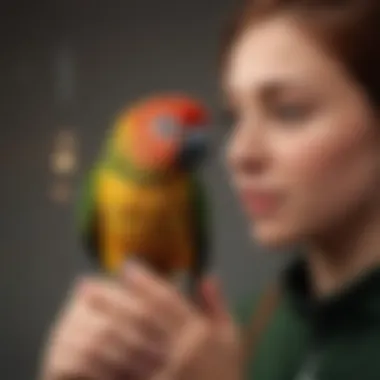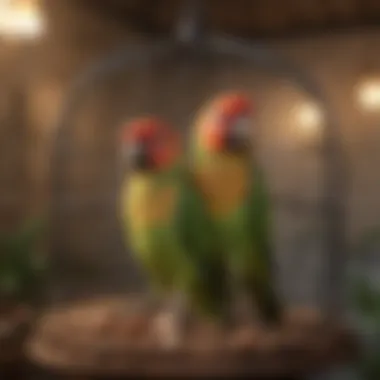Finding Conures Near You: A Guide for Parrot Lovers


Intro
Acquiring a conure is an exciting venture for many parrot enthusiasts. These small, lively parrots bring joy and companionship to their owners. However, finding the right conure involves more than just choosing a pet. One must consider various factors such as the source of the bird, the particular needs of conures, and how to care for them properly.
In this guide, we explore the essential steps for locating conures near you. We highlight the significance of responsible sourcing, how to understand the specific needs of these birds, and ways to nurture a positive relationship. Additionally, we provide insights into grooming, health, and training that will benefit both new and experienced conure owners.
By integrating local and online resources, this guide aims to empower individuals looking to incorporate a conure into their lives while promoting the well-being of these fascinating creatures.
Grooming Techniques
Grooming is a crucial aspect of conure care that often gets overlooked. Regular grooming helps maintain the bird's health and contributes to their overall well-being. Here are several key points regarding conure grooming.
Basic Grooming Tools
Having the right grooming tools is essential. Some of the basic tools include:
- Nail clippers: These help trim the nails to prevent them from becoming too long.
- Bird-safe bath: Providing a way for conures to bathe helps keep their feathers clean.
- Soft brush: This can be used to gently remove dust and debris from their feathers.
Step-by-Step Grooming Guides
- Nail Clipping: Gently hold the bird and carefully clip just the tip of the nails, avoiding the quick, which is the sensitive area.
- Bathing: Encourage your conure to bathe by misting them lightly with water or providing a shallow dish.
- Feather Care: Use a soft brush to smooth out the feathers and remove any loose material.
Breed-Specific Grooming Needs
Conures, while generally requiring similar grooming, may have specific needs based on their breed. For instance,
- Sun Conures may need more frequent baths due to their vibrant feathers attracting dirt.
- Green-Cheek Conures may require extra attention to feather maintenance to avoid picking or chewing.
Health and Wellness
Understanding the health needs of conures is integral to successful ownership. A balanced diet, monitoring for common health issues, and regular veterinary visits play crucial roles in their well-being.
Nutrition and Diet Tips
Conures thrive on a varied diet that includes:
- Pelleted food: Commercial pellets specifically formulated for conures are a staple.
- Fresh fruits and vegetables: These should be offered daily to provide essential nutrients. Good options include apples, carrots, and leafy greens.
- Seeds: While seeds can be included, they should not make up a large portion of the diet due to high-fat content.
Common Health Issues and Solutions
Common health problems in conures include:
- Feather plucking: This can result from boredom; providing toys and interaction can help.
- Obesity: Overfeeding seeds can lead to this condition; monitor intake and diet closely.
Importance of Regular Check-Ups
Regular veterinary visits are necessary to monitor the health of your conure. Avian vets can help identify potential issues early, keeping your bird healthy.
Training and Behavior
Training is essential for a well-adjusted conure. Effective training helps foster good behavior and strengthens the bond between pet and owner.
Basic Training Commands
Teaching basic commands improves communication. Some initial commands include:
- Step up: Helps train them to climb onto your finger or hand.
- Come here: Encourages interaction and can be reinforced with treats.
Understanding Common Behavioral Issues
Conures are social, but they can develop behavioral problems such as:
- Biting: Often a response to fear or discomfort.
- Screaming: This can indicate boredom or a need for attention.
Techniques for Effective Training
Using positive reinforcement fosters a better learning environment. Reward desired actions with treats or praise, and be patient. Consistency in training sessions will yield the best results.
Community Insights
Learning from others can enhance your experience as a conure owner. The parrot community often shares valuable tips and experiences:
User-Submitted Tips and Tricks


Many owners advise regular social interaction to prevent loneliness and promote healthy behavior in conures.
Real-Life Grooming Experiences
Sharing personal grooming stories can provide new insights into best practices.
Expert Guest Contributions
Consulting with experienced bird trainers or avian vets can offer specialized knowledge beneficial to conure care.
In summary, fostering a positive and healthy environment for conures requires important considerations in grooming, health, training practices, and community involvement. By understanding these factors, potential conure owners can make informed decisions and create a fulfilling relationship with their feathered friends.
Understanding Conures
Understanding conures is crucial for those considering these birds as pets. They are small parrots known for their vibrant colors and lively personalities. Without a thorough understanding, potential owners may face challenges in meeting the birds’ needs. Additionally, recognizing their characteristics is vital for fostering a healthy environment and relationship.
Types of Conures
There are many types of conures, each with unique traits and appearances. Common types include the Sun Conure, Green-cheeked Conure, and Blue-crowned Conure. Sun Conures are famous for their striking yellow and orange feathers. Green-cheeked Conures are smaller and generally more gentle, making them a popular choice for first-time owners. Blue-crowned Conures are known for their intelligence and playfulness.
Each type has different requirements and temperaments. Therefore, it’s essential to research specific species to find one that suits your lifestyle and preferences. The diversity of conures allows potential owners to choose based on personal preference and compatibility with their living situations.
Behavioral Characteristics
Behavior plays a significant role in owning a conure. These birds are social, intelligent, and can develop strong bonds with their owners. They often enjoy interaction and engagement, requiring time and attention. Their active nature can lead to playful behavior, including mimicry of sounds and vocalizations.
However, conures also have a tendency to be loud. This noise may be ideal in an active household but could pose challenges in quieter environments. Understanding these characteristics will help potential owners prepare for the responsibility of keeping a conure.
It is beneficial to understand the playful yet sometimes mischievous nature of these birds. Knowing their tendencies will lead to better training and socialization. Proper interaction is key to a thriving relationship with a conure.
Nutritional Requirements
Nutritional needs are essential for the overall health of conures. Their diet should consist primarily of high-quality pellets, supplemented with fresh fruits and vegetables. Foods like apples, leafy greens, and carrots can provide essential vitamins and minerals.
It is crucial to avoid foods that are toxic to birds, such as chocolate, avocado, and caffeine. Monitoring their diet ensures proper weight management and prevents obesity, which is a common issue in captive birds.
A balanced diet enhances the conure's vibrant plumage and energy levels. Therefore, understanding their nutritional requirements contributes directly to their well-being and longevity. The right food choices are key factors in a healthy life for your feathered friend.
Proper nutrition not only supports physical health but also influences mood and behavior in conures. A well-fed conure is often a happier and more engaged companion.
Locating Conures Near You
Locating conures near you is crucial for potential owners. The primary goal here is to ensure that one finds a conure that fits their lifestyle while also supporting ethical practices. Each option available has its unique considerations, benefits, and challenges. Understanding these elements can help you make a responsible choice that prioritizes the well-being of the bird.
Local Pet Shops
Local pet shops can be an option for finding conures. They often have a variety of species and colors. However, it is essential to research the pet shop's reputation. Some shops may not prioritize the welfare of the animals. Before visiting, consider these points:
- Visit the shop: Assess how the birds are housed and their overall health.
- Ask staff questions: Understand their sourcing methods and the care provided.
- Read reviews: Look for customer experiences online to gauge reliability.
While pet shops can be a convenient option, make sure to verify their credibility to ensure the conures are treated properly.
Rescue Organizations
Rescue organizations play a vital role in locating conures. These groups often have conures that need homes, providing a chance to adopt rather than buy. Many rescue organizations offer detailed histories of their birds, allowing potential owners to make informed decisions.
Benefits of adopting from rescues include:
- Cost-effective: Adoption fees are generally lower than purchasing from breeders or shops.
- Support for a good cause: You help give a bird a second chance.
- Behavioral insights: Rescues often provide details on the bird's personality and needs.
Engaging with rescue organizations is a commendable step for anyone considering a conure.
Breeders in Your Area
Finding responsible breeders is another pathway. A reputable breeder can provide you with a well-socialized, healthy conure. To locate a breeder:
- Research: Use online directories, local bird shows, or forums to discover breeders.
- Visit their facility: Ensure that the birds are raised in healthy conditions.
- Ask for health documents: Legitimate breeders will provide relevant health screenings and lineage information.
Choosing a breeder requires careful vetting but can lead to a joyful companionship with a well-adjusted bird.
Online Resources for Conures
The internet offers numerous resources for finding conures. Websites such as pet adoption platforms, bird forums, and social media groups present valuable information.


Consider the following online avenues:
- Adopt-a-Pet: Great for finding local rescues and listed birds.
- Reddit communities: Places to seek advice and listings from fellow conure enthusiasts.
- Facebook groups: Often a hub for finding birds in need of homes.
Online resources provide a wide-reaching platform, enabling potential owners to locate conures that meet their criteria and fostering connections within the bird-loving community.
Evaluating Sources
Evaluating sources is essential when it comes to finding a conure. Not all sellers or organizations operate at the same standards. Knowing how to identify reputable sources helps ensure you acquire a healthy, well-cared-for bird. An informed decision can significantly impact your experience as a pet owner and the well-being of your new conure.
Identifying Reputable Sellers
When looking for a new conure, it is vital to seek sellers who have a good reputation. Reputation can stem from reviews, recommendations, or affiliations with well-known avian organizations. A reputable seller should:
- Provide transparency about their breeding practices.
- Offer documentation related to the bird’s lineage and health.
- Be open to providing references from previous customers.
- Maintain a clean, healthy environment for their birds.
Furthermore, visiting the seller's location is always a good idea. Meeting the animals in person allows you to assess their living conditions and observe their behavior.
Ask the Right Questions
Asking the right questions is crucial when evaluating a potential source for a conure. The types of inquiries you make can reveal much about the seller's knowledge and practices. Consider asking:
- What is the bird's health history? A reputable seller should provide details on any prior medical issues.
- What is their socialization process? Birds require social interaction. Understanding how a seller socializes their conures can give insight into the bird’s temperament.
- What dietary practices do you follow? Proper nutrition is critical for a conure's health. Knowledgeable sellers should be able to discuss their feeding protocols.
- Is there a return policy? Knowing if you can return the bird is important for your peace of mind.
Getting comprehensive answers can help ensure that you are making a responsible choice in bringing a new pet into your life.
Understanding Guarantees and Policies
It is important to understand the guarantees and policies that are in place when purchasing a conure. Different sellers may have varying policies that impact your transaction. Ensure you clarify:
- Health guarantees: Many reputable breeders offer some form of health guarantee for their birds. This ensures that, if any issues arise shortly after adoption, you have recourse.
- Return policies: Knowing whether you can return a bird if it does not fit well in your home is essential for both your and the bird's welfare.
- Documentation requirements: Some locations may require specific documents for ownership. Understanding these can prevent issues down the line.
Understanding these aspects can protect you as a buyer and promote the well-being of your future parrot.
Preparing for a New Conure
Bringing a conure into your home is an exhilarating decision that requires thorough preparation. Understanding the nuances of conure care is essential for creating a healthy and supportive environment for your new feathered companion. This section delves into crucial aspects that will facilitate a smooth transition for both you and your conure.
Setting Up the Environment
A suitable environment for your conure is not just about aesthetics; it is about safety and comfort. Consider the following key elements:
- Cage Size: Choose a cage that offers ample space for your conure to move freely. The dimensions should be at least 24 x 24 x 36 inches for an average-sized conure, allowing room for wings to spread and for climbing.
- Placement: Position the cage in a lively area of the home, but avoid direct sunlight and drafts. Your conure thrives on interaction and will feel happier and less lonely when placed near family activities.
- Toys and Perches: Include a variety of toys to stimulate your conure’s intellect. Perches of different sizes and textures are also vital for foot health. Rotate toys regularly to maintain interest.
Setting up the right environment influences your conure's mood and bonding potential. A well-thought-out space promotes exploration and interaction.
Essential Supplies for New Owners
Equipping yourself with the right supplies before your conure arrives is crucial. Here is a list of necessary items to get started:
- Cage: Invest in a high-quality, sturdy cage that features appropriate spacing between bars. This prevents escapes and potential injuries.
- Food and Water Dishes: Accessible and easy-to-clean dishes ensure your conure stays hydrated and fed.
- Bird Food: Offer a balanced diet that includes pellets, seeds, and fresh fruits and vegetables. Brands like Harrison's and Roudybush can provide high-quality options.
- Grooming Tools: Nail clippers and a bath spray or dish for water baths are required for keeping your bird's feathers and beak in good condition.
- First Aid Kit: Prepare a basic first aid kit specific to bird care. Include materials like bandages, antibacterial ointment, and a safe transport carrier.
Having these supplies ready not only contributes to a seamless adjustment for your conure but also reflects responsible ownership.
Understanding Bonding Techniques
Building a bond with your conure is essential for a harmonious relationship. Effective bonding techniques create trust and comfort between you and your conure:
- Consistency: Spend time daily with your conure without forcing interaction. This includes speaking softly near the cage and allowing them to observe you.
- Positive Reinforcement: Use treats during training or interaction. This encourages your conure to associate you with positive experiences.
- Gradual Introduction: When taking your conure out of the cage, allow it to explore at its own pace. Use your hand as a perch to encourage stepping up once your conure is comfortable.
The bonding process takes time and patience. Building a relationship nurtures security, enhancing your conure’s well-being.
In summary, preparing for a new conure involves thoughtful planning and gathering essential supplies. Establishing a suitable environment, acquiring proper tools, and applying effective bonding techniques set a solid foundation for a fulfilling companionship.
Long-Term Care of Conures
Caring for a conure goes far beyond welcoming them home. Long-term care involves commitment. It ensures a healthy and happy life for these vibrant parrots. Understanding their needs is crucial for any potential owner. Ignoring these elements can lead to health problems and behavioral issues. Investing time and resources now can lead to fewer challenges later.
Grooming and Hygiene
Grooming is a fundamental aspect of conure care. Regular grooming helps maintain their plumage, which is essential for their overall health. This includes trimming their nails and ensuring their feathers are clean. Dirty feathers can lead to skin infections.
To groom your conure effectively:


- Bathing: Provide regular opportunities for your conure to bathe. Some birds enjoy a spray bottle, while others might prefer a shallow dish of water.
- Nail Trimming: Keep their nails short to prevent them from getting stuck or causing injury. Use specialized bird nail clippers.
- Feather Inspection: Check for signs of feather plucking or damage, which may indicate stress or health issues.
Maintaining proper hygiene is equally important:
- Cage Cleaning: Clean the cage at least once a week. Remove all waste and replace bedding.
- Food and Water: Always provide fresh food and clean water daily. This helps prevent bacterial growth and keeps your conure healthy.
Health Issues to Monitor
Monitoring your conure's health is an ongoing task that requires attention. Some common issues can arise if not addressed. Regular vet check-ups are vital. Vaccinations and screenings ensure diseases are caught early.
Be watchful for:
- Air Sac Problems: Difficulty breathing may indicate respiratory ailments.
- Feather Loss: Excessive molting can be a sign of nutritional deficiencies.
- Behavior Changes: Sudden shifts in behavior often signal stress or illness.
Establishing a routine health check at home can also help:
- Observe your bird's beak, feathers, and eyes regularly.
- Monitor their eating habits for sudden changes.
Optimal Diet and Nutrition
The dietary needs of conures are significant for their long-term health. A well-balanced diet supports their energy levels and overall well-being. Feeding conures requires more than just seeds. They need a varied diet for proper nutrition.
For the best results:
- Pellets and Seeds: Choose a high-quality pelleted diet. Use seeds as a complement, not a primary food source.
- Fresh Fruits and Vegetables: Offer a selection of fruits and vegetables daily. Good choices include broccoli, carrots, and apples. Avoid avocados as they are toxic to birds.
- Supplements: In some cases, a veterinarian may recommend additional calcium or vitamin supplements.
Balancing dietary options is key to supporting their health and happiness. Proper long-term care enriches the lives of both conures and their owners.
Understanding Legal Considerations
When acquiring a conure, understanding the legal considerations is crucial. This awareness ensures compliance with local, national, and international regulations concerning the ownership and trade of bird species. Legal parameters play a significant role in protecting wildlife, especially regarding conservation efforts for endangered species.
By understanding legal considerations, potential conure owners not only adhere to the law but also contribute to the well-being of these intelligent birds. Knowledge of applicable regulations can prevent future disputes, fines, or penalties associated with improper ownership practices. This section primarily covers local and national regulations as well as international laws surrounding protected species.
Local and National Regulations
Local and national regulations regarding pet ownership can vary significantly. In some regions, specific laws govern the breeding, selling, and ownership of certain bird species, including conures. It is essential to investigate local statutes and guidelines before acquiring a conure to ensure that you are not infringing any laws.
Additionally, many states require permits for the ownership of exotic birds. Here are key elements to consider:
- Consult local animal control: Your local animal control agency can provide information on specific regulations in your area.
- Understand zoning laws: Some residential areas may restrict the types of pets allowed.
- Check for licensing requirements: Verify if a license is needed for conure ownership.
Researching these aspects can save potential owners from complications later.
CITES and Endangered Species
CITES stands for the Convention on International Trade in Endangered Species of Wild Fauna and Flora. It is an international agreement designed to ensure that trade in wild animals and plants does not threaten their survival. Conures, along with various other bird species, may be covered by CITES regulations.
Understanding CITES is vital because:
- Protection of endangered species: Many conure species are at risk, making compliance with CITES regulations critical for their protection.
- Legal trade: CITES controls legal trade in species, ensuring that conures are not sourced from illegal activities.
- Permits for international trade: If you plan to acquire a conure from another country, you may need special permits.
Adhering to CITES guidelines is essential for anyone interested in obtaining a conure. It helps in supporting conservation efforts and ensuring a sustainable future for these beautiful birds.
Always check both local laws and international regulations before considering adding a conure to your family. Non-compliance can have serious consequences, and awareness fosters responsible pet ownership, benefiting both pets and their owners.
Community Resources
Understanding the role of community resources is crucial for any potential conure owner. These resources provide support and guidance that can enhance not only the experience of owning a conure but also foster a deeper understanding of their needs and behavior. Being part of a community can help individuals learn from others' experiences, gain access to useful information, and build a network of support.
Joining a community allows owners to connect with like-minded individuals, share knowledge, and discuss unique challenges. This can be especially beneficial when establishing care routines or addressing behavioral issues. Therefore, seeking out such resources should be a priority for anyone considering bringing a conure into their home.
Connecting with Local Bird Clubs
Local bird clubs often serve as a valuable platform for conure enthusiasts. These clubs usually arrange regular meetings, workshops, and educational sessions that focus on various aspects of parrot care. Members can gain insights from seasoned parrot owners, participate in discussions, and get recommendations for products and services that foster a healthy environment for their birds.
Some benefits of connecting with local bird clubs include:
- Networking Opportunities: Meeting experienced bird owners can help new owners learn best practices for caring for conures.
- Access to Events: Many clubs sponsor bird shows, educational events, or rescues that benefit both birds and the community.
- Resource Sharing: Members often share resources like breeders, veterinarians, and suppliers that they have found reliable.
These connections can create a supportive environment that encourages responsible parrot ownership.
Online Communities and Forums
In today’s digital world, online communities and forums offer another essential resource for conure owners. Platforms such as Reddit and Facebook host groups where enthusiasts gather to discuss a wide range of topics. Within these spaces, individuals can ask questions, share advice, and discuss their experiences.
Engaging with online communities provides several advantages:
- Immediate Access to Information: With users from various geographic locations, help comes swiftly from someone who may have faced similar challenges.
- Diverse Perspectives: Members with different backgrounds and experiences can offer insights into various care techniques or solutions to problems.
- Support Network: Online communities can provide emotional support, especially during challenging situations. Having a network of people who share similar interests can help ease anxieties related to pet ownership.
In sum, community resources, both local and online, play a significant role in ensuring that conure owners are well-informed and supported. They enhance ownership experiences and can lead to better care and understanding of these birds.







